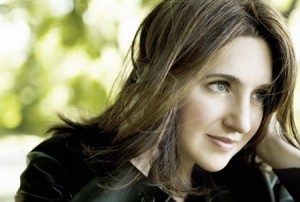
Dinnerstein Bach concert will be major event
Although keyboards themselves have changed over the centuries, so that the music of the 18th century can sometimes sound incongruous on the big concert grand pianos we know today, the music of J.S. Bach remains central to the pianist’s repertoire.
It’s interesting to see how often Bach’s reputation has waxed and waned with audiences, if never with musicians, partly because of the difficulty of the music and partly because it is contrapuntal. By the time of Bach’s death in 1750, counterpoint had already moved into a back-of-the-store compositional department, used frequently but no longer the primary mode of expression.
The concert format as we know it today is often dated to the performances of Bach’s St. Matthew Passion that Felix Mendelssohn mounted in Berlin in 1829 (and the “historical concerts” he presented beginning in 1837 in Leipzig), which were notable not just for their codification of the idea that older music, rather than contemporary music, could be the focus of a concert, but that they marked a renaissance for the average cultured person’s awareness of Bach.
The singular Canadian pianist Glenn Gould, who died 30 years ago next month, made a sensation in 1955 with his reading of Bach’s Goldberg Variations, a recording that still ranks as one of the most important of all classical discs, and that again brought Bach back to the level of contemporary cultural currency. But in all the years that I’ve been going to concerts in South Florida, I still don’t hear Bach solo piano performances very often, which is why I’m so excited about Jan. 13.
That’s the day the wonderful American pianist Simone Dinnerstein comes to the Arsht Center in the opening concert of the Knight Masterworks series. Dinnerstein has made a fine career for herself in the last few years with her playing of Bach, beginning with the Goldberg Variations for Telarc, then for that same label, a record called The Berlin Concert, a live recording from a concert at the Berlin Philharmonic hall in November 2007. That recording includes the French Suite No. 5 (in G, BWV 816), and the 13th Goldberg variation (as an encore); it also holds terrific performances of Beethoven’s final piano sonata (No. 32 in C minor, Op. 111), and the American composer Philip Lasser’s marvelous set of variations on Bach’s chorale Nimm von uns, Herr, du treuer Gott.
What you hear with Dinnerstein, who studied with Peter Serkin and is therefore an heir to the great Central European pianistic tradition through Serkin’s father, Rudolf, is a pianist of marvelous facility and sensitivity, and one whose depth of interpretive detail allows her to inhabit the music in a highly personal way. It’s hard to describe in words, but many’s the time Bach comes across in performance as archaic, severe and inaccessible, and this is never the case with Dinnerstein. It’s always present, warm, and enormously communicative, and she does this without taking any liberties with the music to make it “friendlier” to today’s audiences.
I became a big fan after hearing the Berlin recording, and I’ve made sure to get her follow-ups, beginning with Bach: A Strange Beauty (2011, Sony) which has solo works including a searingly beautiful Ich ruf zu Dir, Herr Jesus Christ (BWV 639), an organ chorale arranged for piano by Ferruccio Busoni, and two of the keyboard concerti with the Kammerorchester Staatskapelle of Berlin.
Her newest disc, Something Almost Being Said (2012, Sony), includes two of the Bach partitas and the four impromptus of Franz Schubert. It, too, is a lovely recording, with the familiar Schubert pieces getting the same kind of illumination Dinnerstein brings to her Bach, and benefiting thereby.
For her recital at 5 p.m. Sunday, Jan. 13, Dinnerstein will play the entire Goldberg Variations at the Knight Concert Hall, which will add choral risers for the audience to make the performance more intimate. As far as I’m aware, this will be her first-ever Miami performance, but the word is already out. According to the Arsht website today, the orchestral box seats, as well as the whole second and third tier, already are sold out.
This concert will be a must-see for pianists in South Florida, and will be one of the more important classical events in this area in a long time. It stands fair to be one of the highlights of the season. [You can see and hear her in depth on her website, simonedinnerstein.com}
***
Speaking of pianists: Adolfo Vidal’s inaugural Miami World Music Festival, which I wrote about a few weeks ago, gets under way tomorrow night with the Miami Chamber Players in two of the Bach Brandenburg Concerti (Nos. 3 and 6) and the Brahms F minor Piano Quintet (Op. 34) at FIU’s Wertheim Auditorium.
Sunday’s performance features two fine local pianists, Kemal Gekic and Margarita Shevchenko, who will be playing both two-piano suites of Rachmaninov in an all-Russian program. The solo music hadn’t been announced when I mentioned it earlier, but I’ve learned that Gekic will play Balakirev’s stemwinder, Islamey, and three short pieces by Rachmaninov – the sixth (in E-flat) and seventh (in C minor) preludes from his Op. 23 collection, and the Elegie (Op. 3, No. 1).
Shevchenko, who has a distinctive, original style, will perform the Sonata No. 2 (in G-sharp minor, Op. 19) of Scriabin, and the most widely admired solo piano of Tchaikovsky, his Dumka (Op. 59). The concert starts at 4 p.m. at the Wertheim, and tickets are $25.
Recent Content
-
Artsarticle ·
-
Artsarticle ·
-
Artsarticle ·

